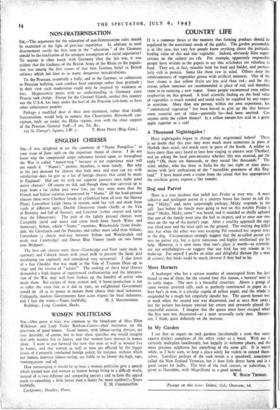ENGLISH CHEESES
SIR,—I was delighted to see the comment of "Numa Pompilius" in your issue of June 29th on the important theme of cheese. I do not know why the compressed soapy substance foisted upon us throughout the War is called " mouse-trap " because in my experience mice will not touch it. " Numa's " protest, therefore, is most timely. But why in his just demand for cheeses that both mice and men can eat with satisfaction does he give us a list of foreign cheeses that could be made in England? Did not we with our superior pastures once make good native cheeses? Of course we did, and though those that survived up to 1939 from a far richer past were few, yet they were more than the French and Italian varieties enumerated by " Numa." Of the hard-pressed cheeses there were Cheshire (made in cylindrical form all over the Mersey Plain), Lancashire Leigh (loose in texture, mild but -ich and made from curds of different ages), Double Gloucester (made chiefly in the Vale of Berkeley and full of flavour), and Leicester (rather coarser and tarter than the Gloucester). The pick of the lightly pressed cheeses were Caerphilly (mild and moist and eaten fresh from South Wales and Somerset), Stilton, which " Numa " mentions, Wensleydale (from Swale- dale, the Clevelands and the Pennines and rather more solid than Stilton), Cottenham (a cheese mid-way between Stilton and Wensleydale and made near Cambridge) and Dorset Blue Vinney (made on two farms near Bridport).
The best soft cheeses were three—Cambridge and York (only made in summer) and Colwick (made with sweet milk to prevent the lactic kid developing too copiously and considered very epicurean). I also know of a fine Cheddar that was made in the Vale of Taunton Dene up to 1942 and the reverse of " jejune." The making of these local cheeses demanded a high degree of experienced craftsmanship and the interposi- tion of the War may well have broken up the handful of artists who made them. But recipes of them remain and, if home-production is not to suffer the same fate as it did in 1921, an enlightened Government would do all in its power to restore these choice little local industries. Unhappily, modern Governments have scant respect for local industries,
and I fear the worst.—Yours faithfully, H. J. MASSINGHAM. Reddings, Long Crendon, Bucks.




























 Previous page
Previous page